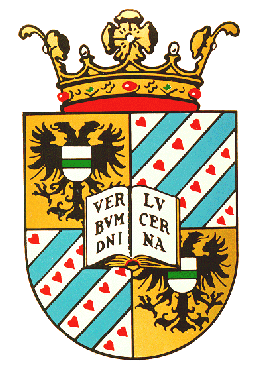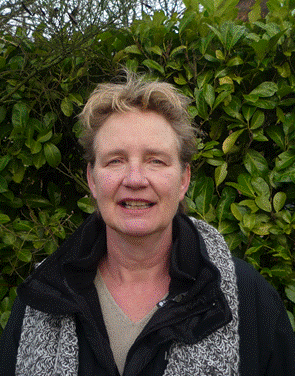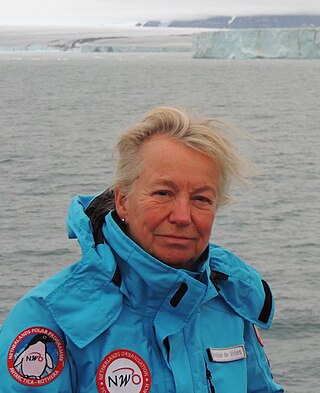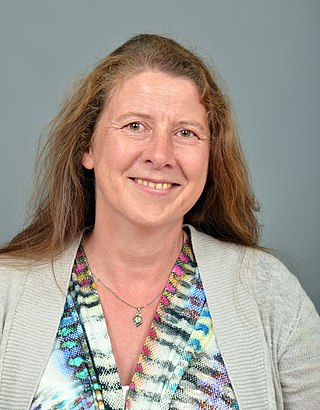
The Antarctic Treaty and related agreements, collectively known as the Antarctic Treaty System (ATS), regulate international relations with respect to Antarctica, Earth's only continent without a native human population. It was the first arms control agreement established during the Cold War, setting aside the continent as a scientific preserve, establishing freedom of scientific investigation, and banning military activity; for the purposes of the treaty system, Antarctica is defined as all the land and ice shelves south of 60°S latitude. Since September 2004, the Antarctic Treaty Secretariat, which implements the treaty system, is headquartered in Buenos Aires, Argentina.

The University of Groningen is a public research university of more than 30,000 students in the city of Groningen in the Netherlands. Founded in 1614, the university is the second oldest in the country and one of the most traditional and prestigious universities in the Netherlands.

The Svalbard Treaty recognises the sovereignty of Norway over the Arctic archipelago of Svalbard, at the time called Spitsbergen. The exercise of sovereignty is, however, subject to certain stipulations, and not all Norwegian law applies. The treaty regulates the demilitarisation of the archipelago. The signatories were given equal rights to engage in commercial activities on the islands. As of 2023, Norway and Russia make use of this right.

The Rothera Research Station is a British Antarctic Survey (BAS) base on the Antarctic Peninsula, located at Rothera Point, Adelaide Island. Rothera also serves as the capital of the British Antarctic Territory, a British Overseas Territory.

Multiple governments have set up permanent research stations in Antarctica and these bases are widely distributed. Unlike the drifting ice stations set up in the Arctic, the research stations of the Antarctic are constructed either on rocks or on ice that are fixed in places.
Dirck Gerritszoon Pomp, alias Dirck China, was a Dutch sailor of the 16th–17th century, and the first known Dutchman to visit China and Japan. Pomp was born in Enkhuizen in the Burgundian Netherlands. As a youth, he was sent in 1555 to Lisbon to live with relatives who were traders, to learn Portuguese and train as merchant. In 1568 at the age of 22, Pomp established himself as a merchant on the isle of Goa off the coast of India. From there, he visited China and Japan aboard Portuguese trading ships.
The British Antarctic Survey (BAS) is the United Kingdom's national polar research institute. It has a dual purpose, to conduct polar science, enabling better understanding of global issues, and to provide an active presence in the Antarctic on behalf of the UK. It is part of the Natural Environment Research Council (NERC). With over 400 staff, BAS takes an active role in Antarctic affairs, operating five research stations, one ship and five aircraft in both polar regions, as well as addressing key global and regional issues. This involves joint research projects with over 40 UK universities and more than 120 national and international collaborations.

The Dutch Research Council is the national research council of the Netherlands. NWO funds thousands of top researchers at universities and institutes and steers the course of Dutch science by means of subsidies and research programmes. NWO promotes quality and innovation in science. NWO is an independent administrative body under the auspices of the Dutch Ministry of Education, Culture and Science. NWO directs its approximate budget of 1 billion euros towards Dutch universities and institutes, often on a project basis. Also, NWO has its own research institutes and facilitates international cooperation. Current president of NWO since April 1, 2021 is Marcel Levi. Former NWO presidents include Stan Gielen, Peter Nijkamp and Jos Engelen.

Arctic cooperation and politics are partially coordinated via the Arctic Council, composed of the eight Arctic nations: the United States, Canada, Iceland, Norway, Sweden, Finland, Russia, and Denmark with Greenland and the Faroe Islands. The dominant governmental power in Arctic policy resides within the executive offices, legislative bodies, and implementing agencies of the eight Arctic nations, and to a lesser extent other nations, such as United Kingdom, Germany, European Union and China. NGOs and academia play a large part in Arctic policy. Also important are intergovernmental bodies such as the United Nations and NATO.
Himadri is India's first permanent Arctic research station located at Spitsbergen, Svalbard, Norway. It is located at the International Arctic Research base, Ny-Ålesund. It was inaugurated on the 1st of July, 2008 by the Minister of Earth Sciences. It was set up during India's second Arctic expedition in June 2008. It is located at a distance of 1,200 kilometres (750 mi) from the North Pole.
Arctic Policy of Norway is Norway's foreign relations with other Arctic countries, and Norway's government policies on issues occurring within the geographic boundaries of "the Arctic" or related to the Arctic or its people. Since Norway is itself an Arctic nation, the Arctic Policy of Norway includes its domestic policies as regards the Norwegian Arctic region.
Oceanwide Expeditions is a Dutch company specializing in expedition-style voyages to Antarctica and the Arctic. Deploying its own fleet of ice-strengthened vessels, Oceanwide emphasizes small-scale, flexible tours that provide passengers close contact with polar wildlife, landscapes, and historical sites. Tours usually take place in regions only accessible by sea, with little to no infrastructure. The locations visited are first reached by ship, after which expedition guides take small groups of passengers to landing sites by way of Zodiac Milpro RIBs, enabling safe cruising and maximum shore time.
Florica Topârceanu is an Antarctic researcher, best known for her work was on Antarctic aquatic viruses and the development of the Antarctic scientific community in Romania. She was the first Romanian woman biologist to study life in Antarctica and the first Romanian woman expert to the Antarctic Treaty.

Anita Gerry Johanna Buma is a Dutch Antarctic researcher, best known for her work on ecophysiology of marine microalgae. She was the first Dutch female researcher in Antarctica.

Siti Aisah Binti Hj Alias is a Malaysian marine polar researcher and lecturer. As of August 2016, she is Associate Professor and Deputy Director of the National Antarctic Research Centre (NARC) in the Malaysian Antarctic Research Programme (MARP), at the University of Malaya. Her work focuses on the physiology of marine and polar microbes and fungi.

Monique de Vries is a Dutch politician and has been with the People's Party for Freedom and Democracy since 1973. From the period 1994-2003 she was the Secretary of State of Transport, Public Works and Water Management. and a member of the House of Representatives.

Corina Brussaard is a leading scientist for Antarctic viral ecology working for the Royal Institute of Sea Research (NIOZ) and is a Special Professor of Viral Ecology at the Institute for Biodiversity and Ecosystem Dynamics of the University of Amsterdam (UvA).

Katja Loos is professor at the Zernike Institute for Advanced Materials of the University of Groningen, The Netherlands holding the chair of Macromolecular Chemistry and New Polymeric Materials.

Dirck Gerritsz Laboratory is a Dutch Antarctic research facility on Adelaide Island near Rothera Research Station. It is operated by the Netherlands Polar Programme of the Dutch Research Council and British Antarctic Survey and was opened on 27 January 2013.
Established in 2004, the Korea Polar Research Institute (KOPRI) is the lead agency for South Korea's national polar programme for the Arctic and the Antarctic and an advisor to the Government of South Korea. Its research projects have focused on biodiversity, climate change and geological evolution. The Institute participates in fora such as the Convention for the Conservation of Antarctic Marine Living Resources, the Council of Managers of National Antarctic Programs, the International Arctic Science Committee and the Scientific Committee on Antarctic Research (SCAR). KOPRI researchers and support staff operate on the icebreaker Araon, on campus at the Korea University of Science and Technology and in the country's three research stations — King Sejong and Jang Bogo in Antarctica, and Dasan at Ny-Ålesund, Svalbard. KOPRI sits within South Korea's Ministry of Oceans and Fisheries. Through international collaboration, KOPRI researches have undertaken studies in Alaska and Canada.













